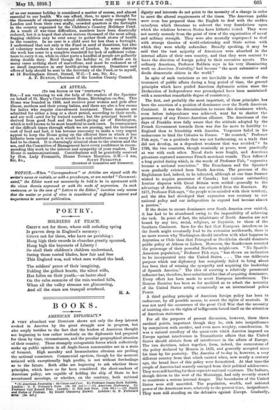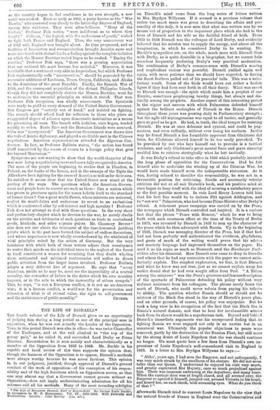BOOKS.
AMERICAN DIPLOMACY.*
A VERY abundant war literature shows not only the deep interest evoked in America by the great struggle now in progress, but also amply testifies to the fact that the leaders of American thought are beginning to toss rather restlessly on the diplomatic, bed prepared for them by time, circumstances, and the peculiar geographical situation of their country. Those strangely antagonistic forces which collectively snake up public opinion in all Anglo-Saxon communities are in a state of ferment. High morality and humanitarian altruism are probing the national conscience. Commercial egotism, though for the moment satiated with exceptionally high profits, is not without forebodings as to the future. Both alike are beginning to ask whether those principles, which have so far been considered the sheet-anchors of American policy, are capable of holding the ship of State to her accustomed moorings, or whether, on the contrary, both national • (1) American Neutrality : its Cause and Cure. By Professor James Nark Baldwin. London : G. P. Putnam's Sons. 12a. ed. net.]—(2) American Diplomacy. By Professor Carl Russell Fish. London : G. Bell and Sons. [10a. i3d.]—(3) Rights sad Duties of Neutrals. By Daniel Chauncey Brewer. London: G. P. Putnam's BOWL [Si. net.] dignity and interests do not point to the necessity of a change in order to moot the altered requirements of the times. The American public were even less prepared than the English to deal with the sudden cataclysm which threatens to subvert the very foundations upon which the relations between States have hitherto rested. They were not merely unready from the point of view of the organization of naval and military strength. They were also mentally unprepared to deal with strange theories of world-relationship and State action with which they were wholly unfamiliar. Broadly speaking, it may be said that the vast majority of Americans were absorbed in the internal affairs of their own country, and that they were content to leave the direction of foreign policy to their executive agents. The ordinary American, Professor Baldwin says in his very illuminating work on American Neutrality,' had become " the most submissive and docile democratic citizen in the world."
In spite of such variations as are inevitable in the course of the treatment of public affairs during a long period of time, the general principles which have guided American diplomatic action since the Declaration of Independence was promulgated have been maintained with a somewhat remarkable degree of consistency.
The first, and probably the most important, of these principles has been the assertion of a position of dominance over tho North American Continent. It was the determination to ensure this dominance which, even before independence was achieved, went far to shatter the permanency of any Franco-American alliance. The Americans of the days of Franklin were fully aware that tho attitude adopted by the French Government towards them was due far more to hostility to England than to friendship with America. Vergennes failed in his endeavours to bind the Colonies to France. " He counted," Professor Fish says, " on a gratitude that was not forthcoming, on a trade that did not develop, on a dependent weakness that was avoided." 2 In 1798, the two countries, though nominally at peace, were practically at war with each other. Naval duels were fought, and American privateers captured numerous French merchant vessels. Than followed a long period during which, in the words of Professor Fish, " expansion became a national conviction." The Frenchman and the Spaniard were gradually evicted from North America. The presence of the Englishman had, indeed, to be tolerated, although at one time Sumner wished to acquire possession of Canada ; but various outstanding frontier disputes with Great Britain were settled—generally to the advantage of America. Alaska was acquired from the Russians. By 1877, Professor Fish says, " the people were satisfied with their territory, and the idea had developed that expansion was contrary to our national policy and our indisposition to expand had become almost a passion."
If the desire to ensure dominance over South America ever existed, it has had to be abandoned owing to the impossibility of achieving the task. In point of fact, the inhabitants of North America are not bound by any ties, racial, religious, or linguistic, to those of the Southern Continent. Save for the fact that European interference in the South might eventually lead to its extension northwards, there is no more reason why Washington should interfere with what happens in Argentina or Chile than that Petrograd or Stockholm should dominate public policy at Athens or Lisbon. Moreover, the Southerners resented the patronage of their powerful Northern neighbours. " No Spanish- American population," Professor Fish says, " has shown an inclination to be incorporated into the United States. . . . The one deliberate purpose which our diplomacy has completely failed to bring about has been that of winning the sympathy and acquiring the leadership of Spanish America." The idea of exerting a relatively paramount influence has, therefore, been substituted for that of acquiring dominance Every effort has been made to avert European interference. The Monroe Doctrine has been so far modified as to admit the necessity of the United States acting occasionally as an international police Power.
A third guiding principle of American foreign policy has been to endeavour, by all possible means, to assert the rights of neutrals. It was not until the occurrence of the great Civil War that the necessity of insisting also on the rights of belligerents forced itself on the attention of American statesmen.
For all the purposes of present discussion, however, these three cardinal points, important though they be, sink into insignificance by comparison with another, and even more weighty, consideration. It was a natural corollary of the quasi-veto which America imposed on Europe against interference in Transatlantic affairs that the United States should abstain from all interference in the affairs of Europe. The two doctrines, taken together, form, indeed, the cornerstone of the policy declared by Monroe in 1823, and generally accepted alines his time by his posterity. Tho America of to-day is, however, a very different country from that which existed when, now nearly a century ago, the broad lines of this policy were formulated. At that time the people of America had scarcely emerged from their political adolescence. They were still battling for their separate national existence. The Indians, though driven to the west of the Mississippi, had only recently ceased to constitute a serious internal danger. The boundaries of the United States were still unsettled. The population, wealth, and national power of the Americans were, relatively to the present time, insignificant. They were still standing on the defensive against Europe. Gradually,
as the country began to feel confidence in its own strength, a now spirit was evoked. Even so early as 1811, a party known as the " War Hawks," who answered very closely to the latter-day Jingoes of England, sprang into existence. They were ultra-bellicose. "Many of the leaders," Professor Fish writes, " were indifferent as to whom they fought." Calhoun, " the logical, with the enthusiasm of youth," wished to fight both France and England. Thus, the very unnecessary war of 1812 with England was brought about. As time progressed, and as facilities of locomotion and communication brought America more and more into touch with distant lands, a feeling against the complete isolation on which the Monroe Doctrine rested began to be evoked. " Daring the nineties," Professor Fish says, " there was a growing appreciation that our national life must become less secluded." Moreover, it was inevitable that a sentiment very akin to Imperialism, but which Professor Fish euphemistically calls " incorporation," should be generated by the successive additions of Louisiana, Texas. Oregon, California, and Alaska to the dominions of the great Republic. Finally, the Spanish War of 1898, and the consequent acquisition of the distant Philippine Islands, though they did not completely shatter the Monroe Doctrine, went far to undermine the essential principles oa which it rested. That war. Professor Fish recognizes, was wholly unnecessary. The Spaniards were ready to yield to every demand of the United States Government. But Congress got " entirely out of hand," and insisted on fighting. The remark should afford food for reflection to those who place an exaggerated degree of reliance upon democratic institutions as a means for preventing all wars. The breach with isolation, once begun, tended rapidly to widen. Porto Rico and the Hawaiian Islands were annexed. Cuba was " incorporated." The American Government was drawn into the toils of Asiatic diplomacy, and played a creditable part in the Chinese negotiations. American representatives attended the Algeciras Con- ference. In fact, as Professor Baldwin states, " the nation has found itself committed by the course of events to a foreign policy that goes far beyond Monroeism."
Symptoms are not wanting to show that the world-character of the war now being waged is being more and more fully recognized in America. The mass of the people are beginning to realize that in Flanders, in Poland, on the banks of the Isonzo, and in the swamps of the Tigris the Allies have been fighting for the cause of America as well as for their own. To outsiders it seems clear that the United States now stand at the parting of the ways. The questions which the American Govern- ment and people have to answer are such as these : Can a nation which has grown to greatness again for the nonce belittle itself to the standard of former times ? Can a great world-Power, whose interests are universal, neglect its world-duties and endeavour to revert to an exelusivism which is condemned alike by self-interest and high morality ? Professor Fish does not attempt to deal with these questions. In the very short and perfunctory chapter which he devotes to the war, he merely dwells on the niceties and intricacies of such questions as trade in contraband goods, blockade, and other cognate points. Mr. Chauncey Brewer3 also does not rise above the treatment of the time-honoured juridical points which in the past have formed the subject of endless discussions, end whose importance is now wholly overshadowed by the whirlwind of vital principles raised by the action of Germany. But the very insistence with which both of these writers adjure their countrymen to centre their minds on the individual trees to the neglect of the forest in itself constitutes a reason for surmising that they doubt whether these antiquated and mistimed controversies will suffioo to divert public attention from the larger issues involved. Professor Baldwia adopts a very different line of argument. Ho says that " every American, pacific as he may be, must see the impossibility of a neutral morality, the cowardice of failure in the duties which his own morality imposes, or in the acts to which the immorality of others compels." This, he says, " is not a European conflict, it is not an un-American war; it is a human conflict, a world-war for the preservation and extension of what is of eternal value, the right to self-government
and the maintenance of public morality." CROMER.



























 Previous page
Previous page